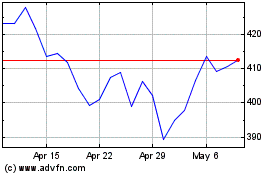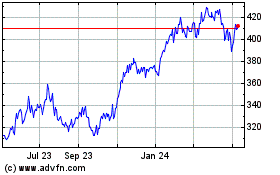Microsoft to Pay $25 Million to Settle Foreign Bribery Probe -- 2nd Update
July 22 2019 - 5:46PM
Dow Jones News
By Dylan Tokar and Drew Hinshaw
Microsoft Corp. agreed to pay $25 million to settle an
investigation into potential violations of a law prohibiting the
bribery of foreign government officials, the U.S. Securities and
Exchange Commission said Monday.
The computer behemoth settled the alleged Foreign Corrupt
Practices Act violations by four Microsoft subsidiaries in separate
agreements with the SEC and the U.S. Department of Justice.
Microsoft, as part of its settlement with the SEC, neither
admitted nor denied the misconduct described by the agency.
In an internal email to company employees on Monday that was
viewed by The Wall Street Journal, Microsoft President Brad Smith
said the misconduct involved a small number of employees that were
no longer with the company.
"We were deeply disappointed and embarrassed when we first
learned about these events several years ago, and we hope that all
of the steps we've since taken, including today's settlement, send
a strong message," Mr. Smith said.
The SEC and Justice Department investigation found that a
Microsoft subsidiary in Hungary had used discounts on software
licenses to fund bribes intended for foreign officials, the
government said. The Hungarian subsidiary has entered into a
nonprosecution agreement with the Justice Department, according to
the agency.
In Saudi Arabia and Thailand, two other Microsoft subsidiaries
provided illegal gifts and travel benefits to government officials
through a slush fund, according to the SEC. A Turkish subsidiary
illegally provided excessive discounts to a third party without
properly recording the transaction, the agency said.
The Wall Street Journal last year reported that U.S.
authorities, including the SEC and the Justice Department, were
probing Microsoft's software sales in Hungary over potential
bribery and corruption allegations.
The $25 million penalty included $16.6 million in disgorgements
of profits and associated interest and an $8.75 million criminal
fine against the Hungarian subsidiary.
The Justice Department said it gave the Hungarian unit a 25%
discount off the criminal fine for cooperating with the
investigation and taking steps to reform its business practices in
the region.
Microsoft has terminated business relationships with four
licensing partners in Hungary, saying they violated its policies.
The company also said it has bolstered efforts to increase
transparency about discounting.
Representatives for Hungary's government and its prime minister,
Viktor Orban, didn't reply to requests for comment. Mr. Orban,
re-elected to a fourth term last year, was in office during the
period of the allegations, 2013 to 2015.
Microsoft pushed into Hungary and its neighbors in the early
2010s, to offset struggles in wealthier, more established markets.
In 2012, then-Chief Operating Officer Kevin Turner, in a publicized
meeting, had dinner with Mr. Orban in an effort to dissuade the
Hungarian government from using free word-processing and
spreadsheet software from rivals.
Over the next two years, Microsoft sold roughly $30 million
annually in software to closely held Hungarian tech companies,
sometimes at discounts that could run as high as 30%, according to
people familiar with the matter. It couldn't be determined how much
of those sales have been subject to scrutiny.
Two then-Microsoft employees in Hungary said they were urged by
management outside Hungary to offer lavish discounts. Microsoft
sales employees based outside of Hungary signed off on the
discounts, according to one of the people.
The company and the Justice Department said Microsoft's
Hungarian employees misrepresented the reasons for the discounts.
The former Microsoft employees said they operated in a culture
where higher-ups didn't ask questions and didn't seem to want to
know.
"[We] feel deeply disappointed by us being blamed for
wrongdoings," said a former senior Microsoft Hungary official.
The deals helped boost sales, and they helped lift the profile
of the local unit. In a press release in June 2015, Microsoft cited
Hungary as its "best-performing...subsidiary, of its size, for two
years running" over the previous five years.
--Anita Kovacs contributed to this article.
Write to Dylan Tokar at dylan.tokar@wsj.com and Drew Hinshaw at
drew.hinshaw@wsj.com
(END) Dow Jones Newswires
July 22, 2019 17:31 ET (21:31 GMT)
Copyright (c) 2019 Dow Jones & Company, Inc.
Microsoft (NASDAQ:MSFT)
Historical Stock Chart
From Mar 2024 to Apr 2024

Microsoft (NASDAQ:MSFT)
Historical Stock Chart
From Apr 2023 to Apr 2024
